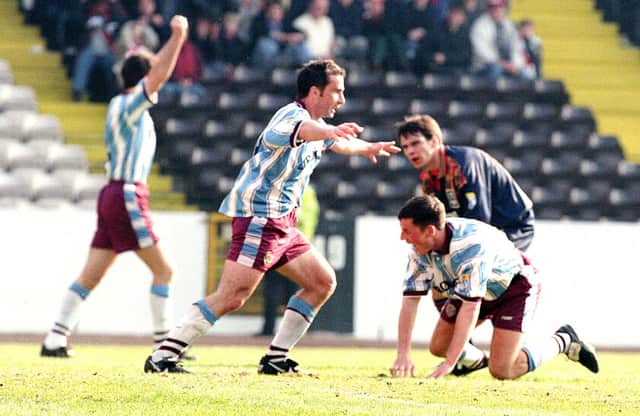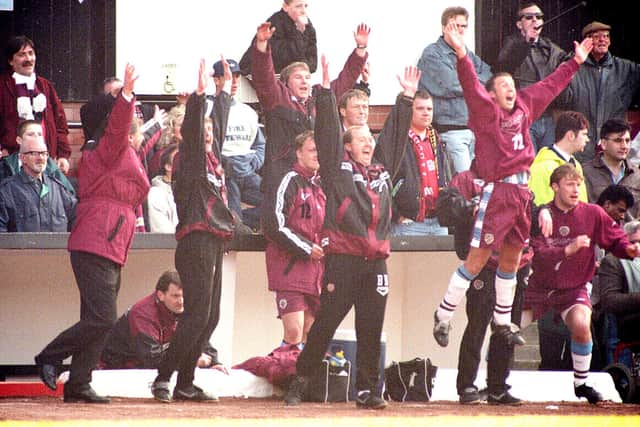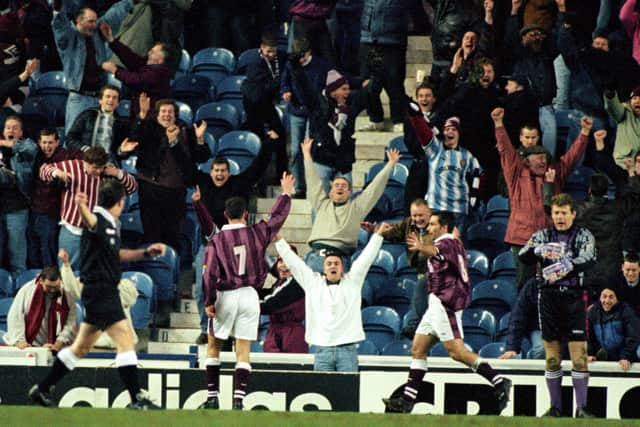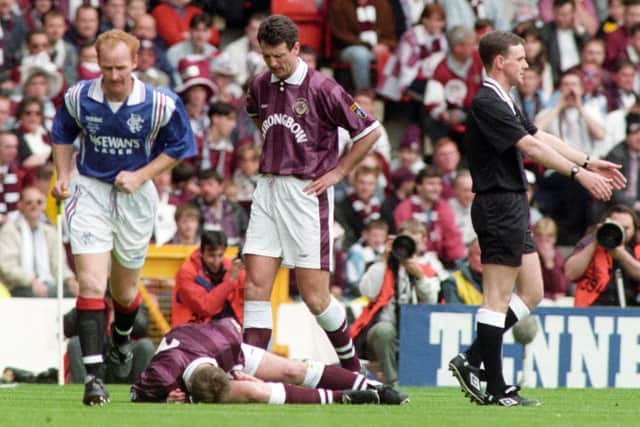Hampden hero recalls ending Hearts' semi-final hoodoo 25 years on


This was particularly true of the relationship with the Scottish Cup. Between 1986, where they lost to Aberdeen in the final the weekend after the crushing defeat at Dens Park cost them a league title, and the April 1996 contest against the same side at Hampden Park, Hearts had managed to lose five semi-finals, including a pair of upsets to Airdrieonians.
Lining up against Roy Aitken’s side, who had already tasted success that campaign after defeating Dundee in the Coca-Cola Cup final, it would have been easy for fatalism to envelop the players. However, the unusual mix of young and old in the Hearts squad that day aided them in their cause and meant excitement was on the mind instead of trepidation.
Advertisement
Hide AdAdvertisement
Hide Ad"Everyone was aware of the significance with the club not getting to a final for a long time, but there was a lot of belief. We had a lot of young players in the squad and, you know what it's like with young boys, there was no fear,” recalls star winger from that season, Allan Johnston.


That belief was bolstered when the two teams took to the park and, similar to another famous semi-final ten years later, it become immediately apparent that while Hearts supporters had sold out their allocation, a visual confirmation of their vociferous backing, the same could not be said of the opposition. Sections of empty seats blighted the Aberdeen end and gave the narrow underdogs an additional hit of confidence.
“The players definitely received a boost,” insists Johnston. "It's incredible the difference fans can make. The games aren't the same when there's not that atmosphere. When you've got the fans behind you it can give you an extra boost, especially when you're maybe losing by a goal or drawing, to go and produce something.”
There wasn’t a lot of production for the majority of the match from either side. After a dull opening period, Hearts manager Jim Jefferies sternly told his players they needed to go out and try to win the match instead of being too concerned with the other side. That looked to have transpired in the 80th minute when club record goalscorer John Robertson, on as a substitute, managed to force the ball home from close range and give his side a 1-0 lead. However, this merely injected life into the match with Duncan Shearer heading home from a free-kick to notch a very late equaliser.
Advertisement
Hide AdAdvertisement
Hide AdThe older players like Robertson and fellow Gorgie hero John Colquhoun would both later say they had a feeling of ‘here we go again’, but thanks again to the youthful naivety in the side the equaliser didn’t burst the bubble of belief.


"We just thought we'd go and win every game at that point. If it went to a replay we were confident that we could beat them. We had the better team, we felt, and more of a goal threat.”
And so it proved. With the match tied at one apiece in injury-time, Robertson retrieved a pass from the left wing, cut inside and sent an inswinging cross that was headed home by Johnston from six yards out.
"It was an amazing feeling,” recalled the match-winner. “Scoring the winning goal in a semi-final at Hampden, in the last minute, it doesn't get much better than that, does it? There's nothing better than when you score goals in big games, especially at that time when you know it's the winner.
"Obviously it would have been better if it was the final.”


Advertisement
Hide AdAdvertisement
Hide AdRangers lay in wait the following month. An intimidating proposition, sure, but Hearts had already beaten Walter Smith’s champions 3-0 at Ibrox with Johnston grabbing a famous hat-trick. To further underline their credentials they defeated the Ibrox side once more in Edinburgh the very next fixture. Johnston was again on the scoresheet in a 2-0 win.
"There was real confidence going into the final. All the big games we thought we could win. We'd beat Rangers at Ibrox and Tynecastle and we expected to win the final. So the result was a bit of a surprise,” Johnston said. “I think the big setback was Gary Locke going off injured so early because he was such a big player for us. It shook us a bit and the gameplan went out of the window. After what we'd done to them during the season, I think they were trying to punish us as well. We were all gutted. It was a horrendous day.”
The 5-1 defeat – known as ‘the Brian Laudrup final’ despite Gordon Durie scoring a hat-trick, such was the Dane’s mastery – would prove to be Johnston’s last game for the club as he took advantage of the newly-introduced Bosman ruling to leave for Rennes in France. He would later move to Sunderland, Rangers and Middlesbrough before playing the majority of his later career at Kilmarnock, where he was again reunited with the manager who helped him blossom so much in that 1995-96 campaign.
"Jim and Billy Brown had a massive influence on my career,” said the now-Queen of the South manager. “They gave us the chance to go and play. With the money Hearts had, I'm sure it would have been pretty easy to bring in guys around 26 or 27, experienced players who had played in the Premier League, but he had that trust in us that we could go and play.”
Advertisement
Hide AdAdvertisement
Hide AdHearts would finally end their 42-year wait for Scottish Cup glory two years later as they were able to overcome Rangers in a 2-1 final victory at Celtic Park. Johnston watched on as a supporter.
Message from the editor
Thank you for reading this article. We're more reliant on your support than ever as the shift in consumer habits brought about by Coronavirus impacts our advertisers.
If you haven't already, please consider supporting our sports coverage with a digital sports subscription.
Comment Guidelines
National World encourages reader discussion on our stories. User feedback, insights and back-and-forth exchanges add a rich layer of context to reporting. Please review our Community Guidelines before commenting.